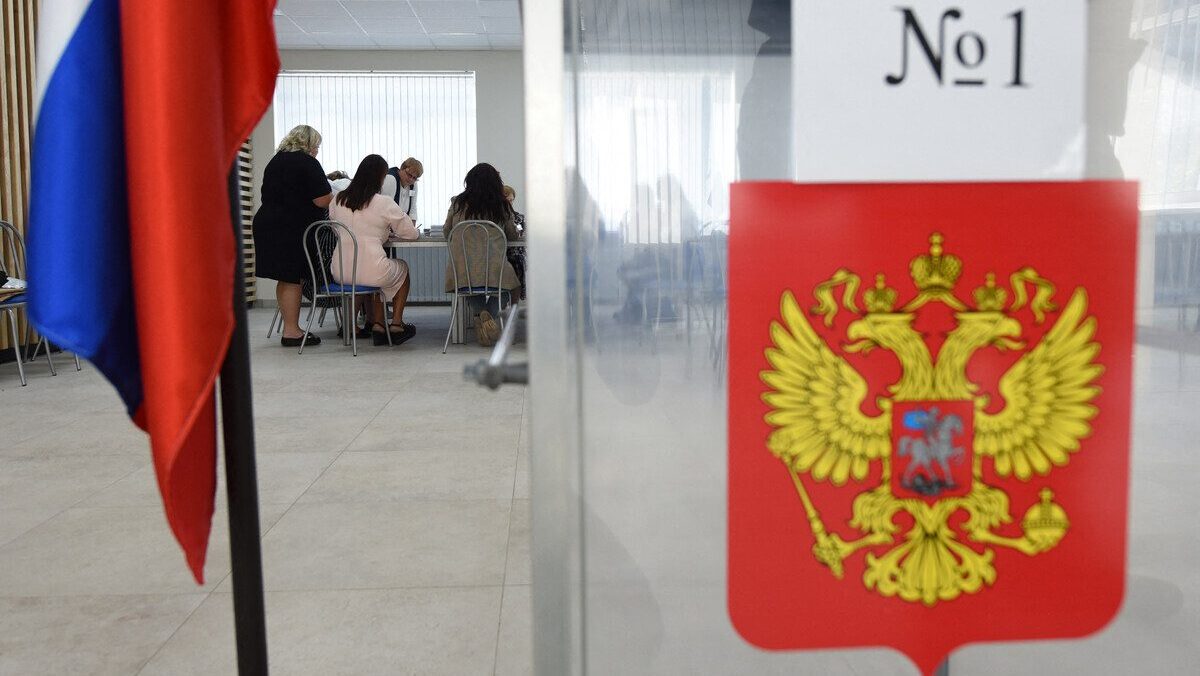
Members of a local electoral commission count ballots at a polling station during local elections organised by the Russian-installed authorities in Donetsk, Russian-controlled Ukraine, on September 10, 2023.
Photo: STRINGER / AFP
There were no surprises in Russia as the governing party United Russia dominated gubernatorial, regional, and local elections held on Sunday in 79 regions of the country. According to results and projections, United Russia is set to receive large majorities in most of the races across Russia, with 60-90% of the population backing the party. Sergey Sobyanin, Moscow’s Mayor since 2010, was easily reelected with 76% of the votes. The Kremlin’s critics argue that elections are not free, as the real opponents of the government have been cowed, exiled, or, like Alexei Navalny, jailed, with critical media shut down. All other significant political forces, including opposition parties, are broadly loyal to Putin and support the war in Ukraine, which Russia launched eighteen months ago.
There are hardly any exciting races, mainly because “the most important issue in Russian politics—the issue of war and peace—is not on the agenda at all,” political analyst Abbas Gallyamov told The Associated Press. He said no one wants to campaign in favour of the war because it is not popular and it would affect their poll ratings. At the same time, it is impossible to campaign against the war because “you will be barred from running, thrown in jail and named the enemy of the country.”
Pro-government analyst Alexei Mukhin, head of the Centre for Political Information think-tank in Moscow, gave a different explanation. “The conflict in Ukraine does influence the general mood, but people are not demoralised, they actually feel mobilised in a psychological sense. In a situation like this you would expect a feeling of fear and doubt to dominate the atmosphere. However, many people feel—more so out of pragmatism than political desire—that this is not the time for political change,” he told The European Conservative. He says that economic sanctions imposed by Western nations against Russia in retaliation for the war have not hugely impacted the day-to-day lives of Russians, and that “most people in Russia think that the special military operation was an acceptable response” by Moscow against Kyiv. Alexei Mukhin reiterated the Kremlin narrative that Moscow’s attack was justified as it had a responsibility to protect Russians living in the Donbas.
The Donbas is the collective term for two eastern Ukrainian regions with large Russian-speaking populations, Luhansk and Donetsk. Since its invasion of Ukraine, Russia currently controls most of the Luhansk region, and large parts of the regions of Donetsk, Zaporizhzhia, and Kherson. After organising internationally unrecognised referenda, Russia declared its annexation of all four areas last September, even though none of the regions were—and still are not—fully under Russian control. Russia previously annexed the Crimean Peninsula in 2014.
Western nations and Ukraine condemned Russia for extending the Russian regional elections to all of these areas, calling them a violation of international law. According to Russian officials, United Russia received large majorities in the regions, taking at least 70% of the vote in each. While many of Donetsk’s and Luhansk’s residents sympathise with Russia, local residents and Ukrainian activists in Kherson and Zaporizhzhia say poll workers made house calls accompanied by armed soldiers, detaining those who refused to vote.
The polls across Russia came ahead of presidential elections next March, which are expected to prolong President Vladimir Putin’s rule until 2030. Putin has been at the helm of the country either as president or prime minister for twenty-three years and is widely expected to be reelected. Novaya Gazeta, a Russian opposition newspaper that moved its offices to Latvia last year following a crackdown by Russian authorities, says in its commentary that the elections “in the third year of the war (for few believe it will end before then) and after a possible fresh wave of mobilisation, will require the Russian people to simulate love for their leader once again.” Alexei Mukhin, however, says that “Russian society does not see this [Putin’s reelection] as a problem, they see this as stability”.
